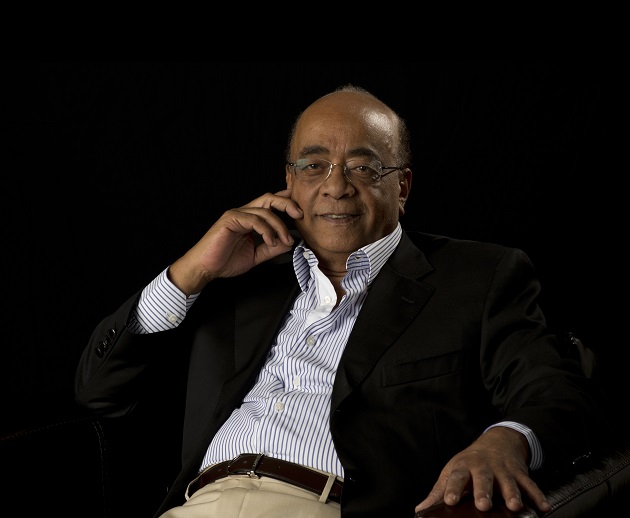
- Founder and Chairman, Mo Ibrahim Foundation (Telecoms, NGO)
“We live to bring these guys out of the shadows for people to know. Because the problem is we have a lot of very good leaders, but nobody knows about them—even Africans don’t know about good African leaders.”
Summary
In this interview, Mo Ibrahim narrates the two facets of his professional career, first, in the telecommunications industry with the launch of Celtel, and later as a corporate philanthropist with the founding of the Mo Ibrahim Foundation.
Ibrahim began his career working as a senior researcher at the University of Birmingham studying radio coverage patterns in urban and rural areas, until he was recruited by British Telecom (BT) to help design the first cellular networks in the UK. He describes this experience as both highly rewarding—being involved as a central figure in the development of a global standard for a new digital technology—and also very frustrating, due to the bureaucratic lethargy of the company and the management’s seeming lack of industry in the mobile space. Ibrahim explains how these concerns ultimately motivated his decision to leave the company and become an entrepreneur. He founded a small company called MSI, Mobile System International, in 1988—a consulting and software company that soon grew into a global undertaking with 110 operators worldwide. Doing business in everywhere from Norway, France, and Denmark to Moscow, Singapore, and Shanghai impressed upon Ibrahim a glaring absence—there was virtually no telecom business in Africa despite the huge demand for service.
In 1998, Ibrahim decided to pursue this gap and launched Celtel to explore the possibility and feasibility of establishing mobile communications networks in Africa. At the time, he recalls, people called him crazy for taking on such a monumental task. But, Ibrahim explains, “being African… I felt I needed to do something for my people—I felt I had a debt to pay back.” This side-project eventually grew into a pan-African company that operated in 13 sub-Saharan African countries.
In the interview, Ibrahim describes how, early on, the board of Celtel developed a unique strategy for dealing with the issue of systemic corruption—one that would protect lower level managers and employees on the ground without stonewalling operations. He also shares a candid assessment of the causes of corruption and the role that business leaders often play in instigating and perpetuating the problem. By the early 2000s, just six years after launching the company, 99 percent of Celtel’s 5,000 employees were native Africans.
In 2004, Ibrahim decided to sell Celtel. In the interview, he elaborates on the circumstances surrounding and factors motivating this difficult decision. Although he looks back at that period with some sadness—“I always feel that we sold a bit early”—he also highlights the huge positive impact that the company had, and continues to have, in the region.
In 2006, Ibrahim went on to found the Mo Ibrahim Foundation, as well as a number of other investment funds designed to support entrepreneurship and promote other social causes. The Foundation is most famous, however, for its governance index that measures, through 90 indicators in over 14 sub-categories, overall governance performance. In the interview, Ibrahim discusses his motivations for launching this index, as well as some of the ways he has already seen it begin to change the nature of conversation surrounding African governance. Another major undertaking of the Foundation is the Ibrahim Leadership Prize, which is awarded to African leaders who have strengthened democracy in their countries during their tenure in office.
Video Clips by Topic
Innovation
Start-up
Human Resources
Social Impact
Mo Ibrahim, the founder of the African telecommunications company Celtel and later a major corporate philanthropist, describes why he created the Mo Ibrahim Foundation in 2006, the creation of an impact fund, and the role of the governance index in improving leadership in Africa.
Additional Resources
- Mo Ibrahim, "Celtel’s Founder on Building a Business on the World’s Poorest Continent," Harvard Business Review, October 2012.
- Geraldine Bedell, "The man giving Africa a brighter future," The Guardian, January 31, 2009.
- Anne Jolis, "Mohammed Ibrahim: The Philanthropist of Honest Government," The Wall Street Journal, September 7, 2012.
- Michael Martin, "Mo Ibrahim: The ‘Bill Games of Africa’," NPR, April 25, 2013.
- Alex Wagner, "Mo Ibrahim and the Quest to Build a Better Africa," HuffPost, April 28, 2011.
- Michael Nwakalor, "There is a Reason Why No One Claimed the Mo Ibrahim Prize This Year,” Ventures Africa, June 17, 2016.
Interview Citation Format
Interview with Mo Ibrahim, interviewed by Tarun Khanna, London, UK, September 15, 2017, Creating Emerging Markets Oral History Collection, Baker Library Special Collections, Harvard Business School.
